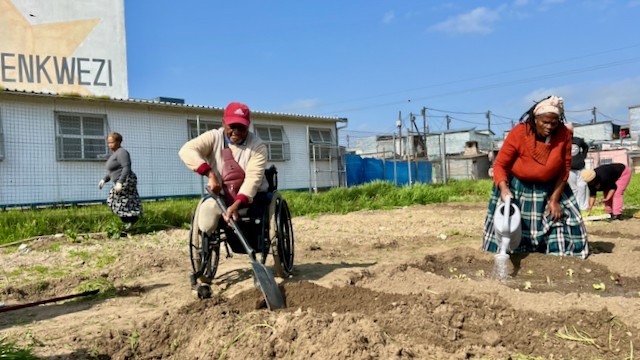Meet Dunoon’s gardeners with disabilities
“Some have hands, some have legs and some have ideas”
Gardening refreshes the mind and takes away stress, says Joshua Matshidiso, working from his wheelchair in his vegetable patch. Alongside him, Thembakazi Sotyantya irrigates seedlings. Photo: Peter Luhanga
- A group of people with disabilities are vegetable gardening in Dunoon.
- Food from the garden goes to a soup kitchen and for their own use.
- The project has received a boost from the local ward councillor’s fund.
On a cold, overcast morning in Cape Town, sitting in his wheelchair, Joshua Matshidiso works with a shovel to prepare a vegetable bed to transplant seedlings. Sometimes he gets out of his wheelchair and works on the ground tending the crops.
Matshidiso and fellow members of Dunoon’s Five Stars Disability Support Group grow vegetables on a vacant patch of land behind Inkwenkwezi Secondary School.
Gardening refreshes the mind and takes away stress, says Matshidiso. “I keep myself busy so that I do not sit and do nothing at home.”
Both his legs were amputated in 2010.
Thembakazi Sotyantya, who survived a car crash in 1999 that left her with severe head and back injuries, says the group used to garden on land beneath the Eskom power lines near the N7 Malibongwe Drive turnoff. But the land was occupied by shack dwellers in October 2020.
“We did not give up. We went to Inkwenkwezi Secondary School to ask for land to do gardening,” she says. “We need vegetables so we can supply ourselves with ingredients for our soup kitchen”.
The soup kitchen feeds members of the disability support group as well as Dunoon residents in need.
Currently spinach, cabbage and beetroot are the main crops.
“Working in the garden makes me feel free. My bones feel great. We have 30 members in the disabled support group. Some have hands, some have legs and some have ideas,” says Sotyantya.
Last week, the group received a donation of gardening tools and vegetable seedlings from Ward 104 Councillor Meisie Makuwa (ANC). The donation is part of a neighbourhood farming project made possible with ward allocation funds.
“We want residents to plant vegetables in their yards. We want people who are unemployed to grow crops to feed their families, as well as giving them the green food for their vitamins,” said Makuwa.
Support independent journalism
Donate using Payfast

Don't miss out on the latest news
We respect your privacy, and promise we won't spam you.
© 2022 GroundUp. This article is licensed under a Creative Commons Attribution-NoDerivatives 4.0 International License.
You may republish this article, so long as you credit the authors and GroundUp, and do not change the text. Please include a link back to the original article.
We put an invisible pixel in the article so that we can count traffic to republishers. All analytics tools are solely on our servers. We do not give our logs to any third party. Logs are deleted after two weeks. We do not use any IP address identifying information except to count regional traffic. We are solely interested in counting hits, not tracking users. If you republish, please do not delete the invisible pixel.

